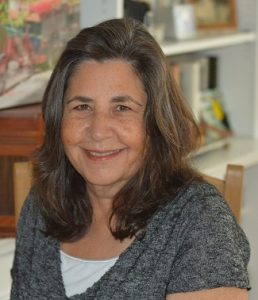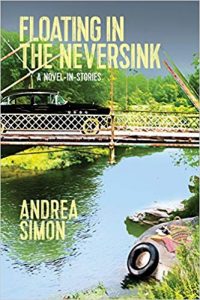Writing About Your Mom Without Guilt
 by Andrea Simon
by Andrea Simon
In the 1960s, there was a famous television commercial for Anacin pain reliever that featured an aproned female stirring a liquid-filled pot at the stovetop. After a hovering older woman suggested adding a little salt from a shaker (that she happened to have handy), the younger one screamed, “Mother, PLEASE, I’d rather do it myself!”
There were many reasons why this angry response struck a familiar note in the American zeitgeist, no more so than it captured the prevalent theme of mother/daughter resentment and independence sprouting from the nascent feminist movement. I was a member of a consciousness-raising group in the 1970s, and the most recurrent discussion topic was “How I’m like (or Unlike) My Mother.” We were a generation obsessed with our maternal ties, no matter how tightly they were pulled.
My mother, like her mother before her, was often outrageous and provocative. I spent a great deal of my youth either being embarrassed by her frank, outspoken behavior or overcome by her intelligence and beauty. And when I eventually became a writer of fiction and literary nonfiction, my sights were focused on my best subject: my not-always-willing mother. She too longed to be a writer, but financial pressures got in her way. Her pride in my work often conflicted with her own frustrated ambitions.
When I was trying to sell my first novel, she called me and said, “I just read the worst book.” I lay on my bed, preparing for a diatribe. Instead, my mother calmly said, “This book was so bad. I just can’t understand why yours isn’t published.”
It could have been worse. Novelist and critic Daphne Merkin wrote: “When I rushed home to impart the news that a piece of fiction I’d written had been accepted by The New Yorker, she [my mother] said, “Your nose looks big when you smile.”
As a teacher and member of a longtime writing group, I read many stories of familial dysfunction and, yes, function. After conducting an online course on “Writing About Your Family” for the Story Circle Network (SCN), a Texas-based women’s group featuring writing and reading circles, I felt it was time to spotlight the mother/daughter relationship in earnest. When SCN asked me to teach a workshop at their national conference in the summer of 2018, I called it, “My Mother, My Muse — Writing About Your Mom Without Guilt.” I crossed my fingers that the more polite women from the South and Midwest would be as forthcoming as my New York cohorts— and that, frankly, someone would sign up.
Six brave women in their 50s and 60s ambled into the conference room and gathered around a circular linen-skirted table, complete with their plastic water bottles, coffee mugs, and legal pads. I stood in front of a long rectangular table, topped by a carboard-backed flip chart, the smallest one I could conceal in a canvas art case. At least, I consoled myself, I didn’t have to worry about the technical failure of a PowerPoint presentation. I could hide behind a photo of my mother and me on the cover of my flip chart, protecting myself from the wrath of feminine criticism.
I introduced the group to my mother with a few crazy anecdotes; the women laughed and nodded. I then handed out sheets, entitled “Fill in the Blank” with ten items, including: “I am most like my mother in __,” “If I could speak to my mother now, I would tell her __,” and “One of the most embarrassing things my mother ever said or did was __.”
I gave the group a ten-minute time limit, and within seconds, I heard groans. One Texan woman, yelled, “Oh, here we go.” The writers didn’t look up until I announced the time. Unfortunately, I didn’t save the worksheets; the women took them to complete at home. But I do recall one woman from Colorado who read her completed response to “I can never understand why my mother ___.” It was, “said she was sorry she had me.”
Wow, that was unexpected. This was not a therapy group, yet the answers were deep and primal. Sure, these women often admired their moms, but their anger and resentments were simmering, desperate to find their way to the page. Now in a safe, nonjudgmental space, they could explore (without guilt) the writerly issues of emotional boundaries and the worth of personal truth.
The time flew by with the women responding to other exercises and recounting their mother/daughter experiences. With 20 minutes remaining, I gave them a sheet with six writing prompts. Afterwards, we only had five minutes to listen to a few paragraphs. One woman fashioned her mother’s story in the first person as an autobiography. It was a life marked by sadness and regret. I was not the only one to hold back tears.
Three of the workshop women kept in touch. One shared her writing blog; another her success on a novel she introduced in our workshop. The third asked me to edit a piece she wrote about her mother that she was submitting to a magazine. Sometimes, only a short time is required to plant the seeds of connection.
The workshop taught me (or confirmed) many lessons. Women have similar desires and frustrations, no matter their age, stage, or geographical location. This is especially true of female writers who struggle with their sense of isolation, rejection, and need for acceptance — all foundational qualities emanating from the first relationship handed down through the female generational divide. As author Erica Jong said: “What use are all the struggles of your mother, your grandmother, your great-grandmother? Make no mistake, these ancestors are watching you. If you disappoint them, you disappoint yourself.”
—
Andrea Simon is a writer and photographer who lives in New York City. She is the author of a memoir/history, Bashert: A Granddaughter’s Holocaust Quest, now in a paperback edition; an award-winning historical novel, Esfir Is Alive; and her new novel-in-stories, Floating in the Neversink. She holds an MFA in Creative Writing from the City College of New York where she has taught introductory writing and creative writing.
FLOATING IN THE NEVERSINK
 “Her keen observations are those of a Jewish teen coming of age…. This novel too has its dark edges, as Simon explores complexities of friendship and family.” —The New York Jewish Week
“Her keen observations are those of a Jewish teen coming of age…. This novel too has its dark edges, as Simon explores complexities of friendship and family.” —The New York Jewish Week
“A thought-provoking and beautifully written book that will challenge how its readers think about how an individual weaves the tapestry of her family’s collective memory.” —Rabbi Deborah Miller, Books and Blintzes
In the summer of 1955, nine-year-old Amanda Gerber tearfully leaves her best friend, Francine, and their adventurous life on her block in Brooklyn’s Flatbush. She joins her cantankerous family on the long, hot drive to her grandmother’s home in the Catskill Mountains among the city’s Jews who flock to countless hotels and bungalow colonies in the heyday of the Borscht Belt. In the idyllic mountains, Amanda becomes ensconced in the tumult of her extended family and their friends, often seeking solace in the woods with her beloved cousin Laura.
Through the following summers, interspersed with the heightened drama of her emotionally charged city life, Amanda faces severe tests to her survival mechanisms, including the pain of loss, abuse, and betrayal, while family secrets threaten to disrupt her life even further. A novel-in-stories, Floating in the Neversink is a testament to the power of survival, friendship, and love.
BUY THE BOOK HERE
Category: Contemporary Women Writers, How To and Tips

























An excellent and thought-provoking piece — as is FLOATING IN THE NEVERSINK. Thank you, Andrea, for your wisdom, insights, and funny stories.
Thanks so much, Katherine. I really appreciate your comments.
Andrea Simon, I wish you would teach another workshop on Mother and Daughter relationships like the one you described in this article. I would sign up to take it in a heartbeat!
Hi, Jane. I plan to teach an online course on this subject, possibly in early summer.
Andrea Simon has given me a lot to think about in this new year. Writing about my mother wasn’t on my to-do list, but it is now. It’s time for me to explore “writerly issues of emotional boundaries and the worth of personal truth.” Thanks for the encouragement, Andrea.
Thanks so much, Pat.
Excellent article. It rang a lot of bells for me. Despite not being a writer myself, I very much identified with the women in the workshop, as well as with the leader. It made me realize that there is still so much room for women to speak openly about their relationships with their mothers. Great article !!!
Thanks so much, Penelope. I appreciate your feedback.